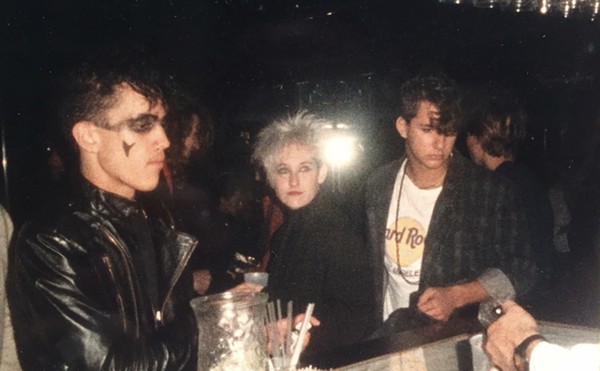Hooks are very important to The Fratellis. In fact, it’s hard to think of an album released in this decade that possesses more do-do-do’s and la-la-la’s than the debut release from this Glasgow, Scotland band.
In some quarters, the group is being hyped as a tartan second coming of the Arctic Monkeys, and it’s easy to see why. The Fratellis have all their proper UK-pop influences in order, from workaday touches of Face to Face-era Kinks to early Blur sass to the Arctic Monkeys’ adrenalized club hopping. The Fratellis’ iPod commercial hit “Flathead,” with its opening charge of acoustic skiffle, even recalls the abrasive melodicism of the long-forgotten La’s.
Reminding listeners of these formidable bands is a double-edged sword, because you also find yourself remembering how much more vital, inspired, and clever all those groups were/are than The Fratellis. Compared to the preternaturally insightful narratives of the Arctic Monkeys, “The Gutterati?” and “Vince the Loveable Stoner” feel like look-at-me titles with prosy, anti-climactic songs to support them. The generally flat production, with crunchy, compressed guitars consistently overpowering the rhythm section, doesn’t help.
Every now and then, however, the pub-singalong hooks are simply too infectious to deny. The jangling “Whistle For the Choir” has an endearing Old 97’s country-pop quality, while the chunky upstrokes of “Everybody Knows You Cried Last Night” make it the album’s best-constructed rocker.
But if we think of The Fratellis as one of the best hopes for Scottish pop since the Bay City Rollers, they’re about as simple-minded as that ’70s pre-teen phenomenon, and not quite as much fun.
— Gilbert Garcia
Mar Superstars
Instrumental rock had a brief cultural heyday in the early 1960s, when everyone from the Ventures to Dick Dale to Duane Eddy created a soundtrack for teen hedonism. That period coincided with the decline/departure of rock’s first wave of charismatic performers, when the faceless appeal of instrumental artists offered the comforting suggestion that rock’s power hinged on its groove, not on a sexually transmitted cult of personality.
In the indie-rock era, the few notable instrumental bands, such as Mogwai or Dirty Three, have created mournful background music: slow, elastic pieces with brooding dispositions and no regard for traditional song structure.
Fin Del Mar, a gifted San Antonio quintet, doesn’t fit easily within any accepted notion of instrumental rock, because their music doesn’t rest easily in the background — it demands your full attention. While pulsating raveups such as “The Dance Number” (imagine the hi-hat rhythm of “Theme From Shaft” with guitar harmonics from U2’s Boy) and “Loud, Careless Mistakes” don’t offer the concise melodic lines found on early instrumental-rock records, they feel like tightly arranged songs, not merely open-ended workouts.
Driven by the seamless rhythm section of drummer Johnny Hernandez and bassist John Cortez, with keyboard icing from Robert Cevallos, and the icy guitar grandeur of Jose Carrillo and Rob Lucio, this band creates wonderfully atmospheric frameworks. The highlights, such as the churning “The Newest Ripomatic” and the deliberate “Letterbox Epic,” sound like movements in a score for a film that doesn’t exist.
The downside is that, because this music demands close scrutiny, it often leaves you wondering what these tightly wound tracks could achieve with a top-notch vocalist. But for now, they’ll happily settle for being hip, home-karaoke fodder for all of SA’s aspiring indie-rock singers.
— Gilbert Garcia
Trash and Vaudeville
Jesse Malin’s taste in records, film, culture, the types of women and workaday joes he writes about, and even his nods-to — from Robin Hood, Lenny Bruce and Midnight Cowboy’s Joe Buck to Motown, the Stones, the New York Dolls and the Jam — is suitably bittersweet. The allusions become little metaphors for blemished promise and telling plot points in his narratives. (That he’s even writing songs with real narratives says a lot.) Malin continues to exist in that lonely world of record-listening, film-character fascination, and street observation. At least that’s how it comes across on his third solo album.
He’s gotten good at singsong day-to-day melancholy (“Lucinda,” Broken Radio,” “Aftermath”), as if under affectionate tutelage from Bruce Springsteen. His “little anarchist” in “Black Haired Girl” is that chick you glimpse on the corner and in the subway who instills a dull ache in your gut just as sunset fades on a Manhattan skyline, and it’s a yearning and curiosity for the one you’ll never get — but if you could you’re convinced you’d rule the world.
There’s also a soaring rock ’n’ roll buoyancy here (particularly the poly-sex anthem “In the Modern World” and the downright cheery “Little Star”) and the singer’s no longer ranting woefully about burnt ambition and expected letdowns. Why should he? It’s easy to see: In DGeneration, Malin purchased the rock ‘n’ roll myth and all he got was a swollen liver. Here he sings a duet with Springsteen. He’s got Dylan’s kid on another tune. His bud Ryan Adams is ubiquitous. He has Euro press on their knees. He keeps getting record deals and his career is chugging along quite nicely. Life could be much worse. He could’ve ended up like Nikki Sudden.
Some songs pop blatantly in that sell-out-done-well sense, like when David Johansen made In Style or when “Hungry Heart” hit the radio. The Bob Caggiano and Eddie Wuhl-helmed album is slick, smooth, punchy, and compressed; capped with lovely harmonies here and thick radio arrangements there. “NY Nights” is classic ‘70s radio pop, that period marked with swelling strings, stereo acoustic guitars, and mellow distortion; as strings, la-la-la-la refrains, and dynamic tension build you wonder if Malin’s out hunting for Jimmy Webb’s Ghost of Hits Past.
Malin’s ubiquitous references to “radio” reveal a kid who grew up believing in AM and its power to change the world. Hell, it changed him. He’s a student of Brill-Building pop, of Gordy’s Motown song machine, of Springsteen’s empathy for lonely waged folk, and it’s all filtered through boyhood dreams of Max’s Kansas City. Seven-day weekend indeed.
— Brian Smith
















